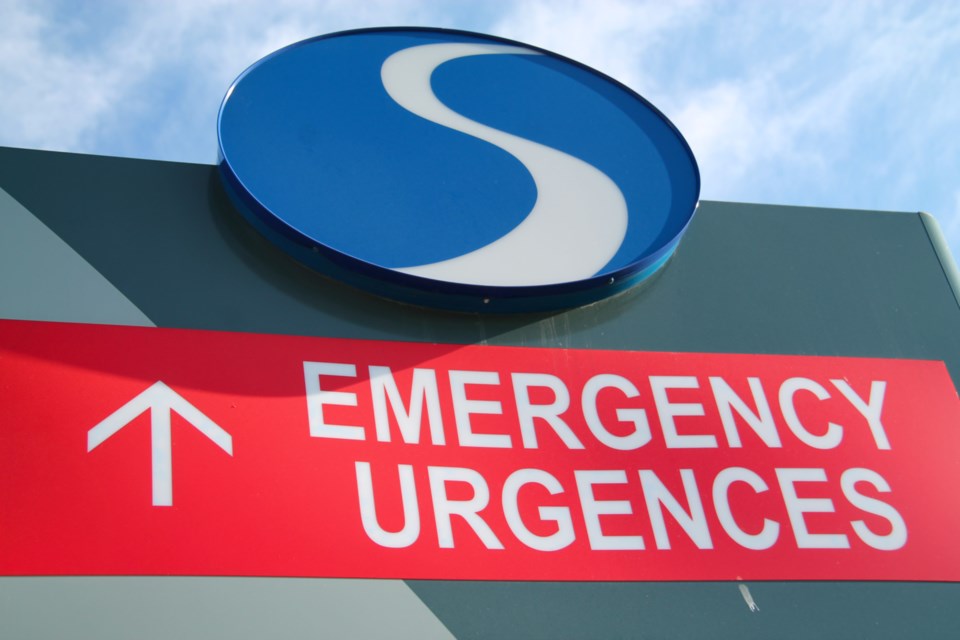Monday’s Sault Area Hospital board of directors meeting was not the stuff that good news stories are made of.
A written brief supplied to directors, penned by Sue Roger, SAH vice president of clinical operations and chief nursing executive, highlighted staffing problems and other issues.
“It is a very dynamic situation for health care across the country, across the province and we really aren’t any exception,” said Ila Watson, SAH president and CEO, addressing the board.
“Although we have not experienced some of the challenges faced by other hospitals like ED closures and significant impacts to operations, our operations need to be closely monitored because we are really functioning in a fragile health system,” Watson said.
Watson acknowledged that registered nurses are in short supply across the health care system, pointing to a Registered Nurses’ Association of Ontario report stating that the province entered the COVID-19 pandemic nearly 22,000 RNs short compared to the rest of Canada.
Watson said the shortage is deeply rooted in governmental fiscal restraint over the past 30 years.
Critics of Ontario’s health care system have said that ED closures at some of the province’s hospitals are due to the nursing shortage and have blamed that on the Ontario government’s Bill 124, which has kept nurses’ pay at a one per cent raise per year and has led some overworked and underpaid nurses to leave the profession while discouraging others from entering it.
“Currently Sault Area Hospital has approximately 140 vacancies across all departments and all classifications of health care workers. Almost half of those vacancies are nursing positions,” Watson said.
“We have had a small number of surgical cancellations and public notices about ED staffing pressures and consequently long wait times at emerg. It needs to be understood both by the board and by the community that we may face more challenging decisions and we will do that with quality and safety at the forefront,” Watson said.
Watson said that SAH has not used nurses employed by agencies outside the hospital - who are paid more than hospital nurses - and is not currently considering doing so.
“We would rather look for ways to ensure that we’re maximizing opportunities as SAH employees continue to focus on how do we make the work environment one that is appealing, comfortable, safe and one where people feel supported to be able to do their work as employees of our organization.”
Watson also spoke of the ongoing issue of alternate level of care (ALC) patients waiting for placement in long term care homes.
“Sault Area Hospital has recently been averaging 57 ALC patients a day. Currently we have 15 patients waiting for long term care placements.”
Watson said SAH - like other Ontario hospitals - will abide by the Ontario government’s Bill 7 that stipulates hospital patients awaiting placement in their preferred long term care home will be moved to a long term care facility not of their choosing to free up bed space for patients needing acute care.
Such patients in southern Ontario can be moved to a LTC home up to 70 kilometres away, while those in northern Ontario may be moved up to 150 kilometres away.
“We recognize that difficult decisions must be made, however we are committed to ensuring that this legislation is implemented in a compassionate and respectful way that aligns with our hospital values,” Watson said.
Sault MPP Ross Romano told SooToday earlier that the Sault has new LTC beds on the way, while Algoma - Manitoulin MPP Michael Mantha said that the government’s Bill 7 is “scary.”
On another topic, Watson said over 20 per cent of ED patients are predicted to arrive by ambulance.
“Our ambulance offload times are monitored daily because it is so important that the community has sufficient EMS coverage to manage the 911 call volume. Our target for EMS offload is 40 minutes with varying performance from day to day. Our year to date performance is 66 minutes on average. This is an area of attention for us and we partner closely with EMS to look for new opportunities to manage this concern.”
SAH Board Chair Brent Rankin asked Watson if there is anything the public can do as the hospital wrestles with all of its challenges.
“Seek care when you need it and if you can possibly avoid coming when we are in strange circumstances and if care is likely better delivered somewhere else, that would be a good action to take,” Watson replied.
Meanwhile, Dr. Silvana Spadafora, SAH chief of staff, reported that the medical community has seen a number of physicians retiring and some doctors experiencing burnout.
“There’s a constant need for family physicians. We have done well in terms of always replacing those that have left but the overall picture is that we still need many more workers at the wheel,” Spadafora said.
“We are heavily dependent on locum anaesthesia coverage at this time and have had short periods of physician pressure as a result this summer,” Roger’s report added.
Amid the heavy nature of Monday's meeting, there was some positive news presented to the board.
Watson said that all long-wait patients have had their surgery completed and SAH has resumed its normal approach to surgical wait time management.
The hospital met all of its cancer patient requirements and all urgent surgeries throughout the pandemic.
Other good news in an otherwise sombre meeting included:
- The Renal Dialysis program’s receiving new Braun ‘smart machines’ from Germany that automatically adjust run rates to avoid adverse symptoms for patients
- The Cardiac Catheterization lab receiving final approval from the Ministry of Health to move forward with the second Cath lab build with construction contracts to be awarded soon
- The three-month MRI replacement project's completion in August, providing SAH with a state of the art MRI
